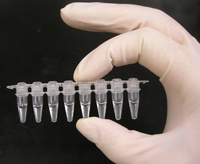
Rickettsial genomics and the paradigm of genome reduction associated with increased virulence.
Sign Up to like & getrecommendations! Published in 2018 at "Microbes and infection"
DOI: 10.1016/j.micinf.2017.11.009
Abstract: Rickettsia species are arthropod endosymbiotic α-proteobacteria that can infect mammalian hosts during their obligate intracellular lifecycle, and cause a range of mild to severe diseases in humans. Paradoxically, during their adaptation to a bottleneck lifestyle,… read more here.
Keywords: rickettsial genomics; genomics paradigm; evolution; virulence ... See more keywords

Multiple concurrent and convergent stages of genome reduction in bacterial symbionts across a stink bug family
Sign Up to like & getrecommendations! Published in 2021 at "Scientific Reports"
DOI: 10.1038/s41598-021-86574-8
Abstract: Nutritional symbioses between bacteria and insects are prevalent and diverse, allowing insects to expand their feeding strategies and niches. A common consequence of long-term associations is a considerable reduction in symbiont genome size likely influenced… read more here.
Keywords: reduction; stages genome; family; stink bug ... See more keywords

Microsporidian Introns Retained against a Background of Genome Reduction: Characterization of an Unusual Set of Introns
Sign Up to like & getrecommendations! Published in 2019 at "Genome Biology and Evolution"
DOI: 10.1093/gbe/evy260
Abstract: Abstract Spliceosomal introns are ubiquitous features of eukaryotic genomes, but the mechanisms responsible for their loss and gain are difficult to identify. Microsporidia are obligate intracellular parasites that have significantly reduced genomes and, as a… read more here.
Keywords: reduction; retained background; introns microsporidian; microsporidian introns ... See more keywords

Genome-scale top-down strategy to generate viable genome-reduced phages
Sign Up to like & getrecommendations! Published in 2022 at "Nucleic Acids Research"
DOI: 10.1093/nar/gkac1168
Abstract: Abstract Efforts have been made to reduce the genomes of living cells, but phage genome reduction remains challenging. It is of great interest to investigate whether genome reduction can make phages obtain new infectious properties.… read more here.
Keywords: genome reduced; genome; genome reduction; genome scale ... See more keywords

Single-amplified genomes reveal most streamlined free-living marine bacteria.
Sign Up to like & getrecommendations! Published in 2023 at "Environmental microbiology"
DOI: 10.1111/1462-2920.16348
Abstract: Evolutionary adaptations of prokaryotes to the environment sometimes result in genome reduction. Our knowledge of this phenomenon among free-living bacteria remains scarce. We address the dynamics and limits of genome reduction by examining one of… read more here.
Keywords: single amplified; free living; amplified genomes; reduction ... See more keywords

Hypothesis: Gene‐rich plastid genomes in red algae may be an outcome of nuclear genome reduction
Sign Up to like & getrecommendations! Published in 2017 at "Journal of Phycology"
DOI: 10.1111/jpy.12514
Abstract: Red algae (Rhodophyta) putatively diverged from the eukaryote tree of life >1.2 billion years ago and are the source of plastids in the ecologically important diatoms, haptophytes, and dinoflagellates. In general, red algae contain the… read more here.
Keywords: nuclear genome; plastid; gene; red algae ... See more keywords

Phylogenomics Reveals that Asaia Symbionts from Insects Underwent Convergent Genome Reduction, Preserving an Insecticide-Degrading Gene
Sign Up to like & getrecommendations! Published in 2021 at "mBio"
DOI: 10.1128/mbio.00106-21
Abstract: We have studied genome reduction within several strains of the insect symbiont Asaia isolated from different species/strains of mosquito and medfly. Phylogenetically distant strains of Asaia, despite following a common pattern involving the loss of… read more here.
Keywords: genome reduction; insects; gene; asaia ... See more keywords

Horizontal Gene Transfer to a Defensive Symbiont with a Reduced Genome in a Multipartite Beetle Microbiome
Sign Up to like & getrecommendations! Published in 2020 at "mBio"
DOI: 10.1128/mbio.02430-19
Abstract: Associations between microorganisms and an animal, plant, or fungal host can result in increased dependence over time. This process is due partly to the bacterium not needing to produce nutrients that the host provides, leading… read more here.
Keywords: genome reduction; symbiont; horizontal gene; reduction ... See more keywords

Endogenous Plasmids and Chromosomal Genome Reduction in the Cardinium Endosymbiont of Dermatophagoides farinae
Sign Up to like & getrecommendations! Published in 2023 at "mSphere"
DOI: 10.1128/msphere.00074-23
Abstract: As bacterial endosymbionts, Cardinium typically undergoes genome reduction, but the molecular process is still unclear, such as how plasmids get involved in chromosome reduction. Here, we de novo assembled 2 genomes of Cardinium in astigmatic… read more here.
Keywords: cardinium; chromosomal genome; endogenous plasmids; cardinium endosymbiont ... See more keywords

Less Is More: Genome Reduction and the Emergence of Cooperation—Implications into the Coevolution of Microbial Communities
Sign Up to like & getrecommendations! Published in 2019 at "International Journal of Genomics"
DOI: 10.1155/2019/2659175
Abstract: Organisms change to adapt to the environment in which they live, evolving with coresiding individuals. Classic Darwinism postulates the primal importance of antagonistic interactions and selfishness as a major driver of evolution, promoting an increase… read more here.
Keywords: less genome; microbial communities; genome reduction; reduction emergence ... See more keywords

DELEAT: gene essentiality prediction and deletion design for bacterial genome reduction
Sign Up to like & getrecommendations! Published in 2021 at "BMC Bioinformatics"
DOI: 10.1186/s12859-021-04348-5
Abstract: Background The study of gene essentiality is fundamental to understand the basic principles of life, as well as for applications in many fields. In recent decades, dozens of sets of essential genes have been determined… read more here.
Keywords: gene essentiality; bacterial genome; gene; essentiality ... See more keywords